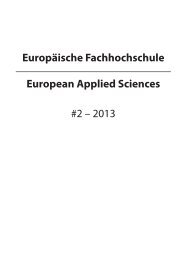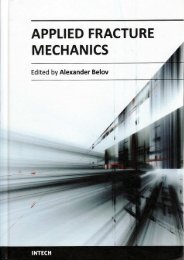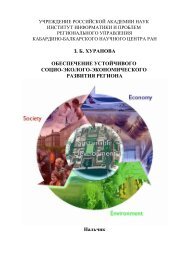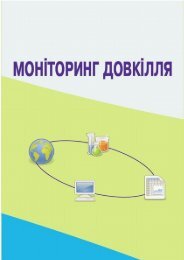20 EUROPEAN APPLIED SCIENCESи наделена приключенческая литература; а ее специфика как особенного наджанрового образования раскрывается посредствомособенностей поэтики, которые не изобретаются каждый раз заново, а лишь модифицируются зависимо от жанра.Основной категорией поэтики приключенческой литературы является сюжет произведения. «Приключенческое появляется в литературе,как только она начинает себя осознавать литературой, и представляет собой доминирование остросюжетного начала над описательными действия над героем» 1 . Понимая приключение как некий событийный троп, А. Вулис выделяет такие его признаки: случайное совпадениекак монтажная основа композиции, драматический подтекст, игра как содержание и как компонент формы, атмосфера чуда и т.д 2 ..В плоскости читательской рецепции (речь идет о восприятии произведения ребенком или подростком) акценты, расставленныев свое время писателем, могут смещаться. Так, например, роман «Приключения Гулливера» Дж. Свифта учеными сегодня определяетсякак сатирический, «Дон-Кихот» М. Сервантеса — пародия на рыцарский роман. Юные же читатели в них видят преждевсего приключения с необычными обстоятельствами и ситуациями, в которые попадают главные герои. То же самое можно сказатьи о произведениях о детях, например, В. Винниченко, герои которых расцениваются реципиентами не как сложные психологическиетипы, а как персонажи авантюрного сюжета. Это еще раз подчеркивает коммуникативную сущность художественной литературы,которую можно определить как способность быть понятной как для общества в целом, так и для его отдельных слоев. Понимание,обусловленное «внутренними и внехудожественными факторами, предстает плоскостью, в которой пересекаются векторыартистической или аналитической коммуникации, и реализуется через язык и речь , которые смещены из лингвистическойсферы в философско-герменевтическую» 3 . Для достижения взаимопонимания между автором и читателем необходим комплексзнаний, общий для всех коммуникантов. Это обусловливает его сравнительную относительность прежде всего потому, что знанияотображают диалектику абсолютной и относительной истины. Мышление человека постоянно движется от незнания к знанию,от поверхностного ко все более глубокому, сущностному и всестороннему знанию 4 .Именно этим фактом (желанием достичь коммуникативного согласия с реципиентом), очевидно, и обусловлено стремление писателей,которые творят для детей, «одеть» сюжет, например, исторической или школьной повести в приключение, доказывая таким образомв который раз способность жанров постоянно обновляться. Балансирование на грани простоты и сложности, между опытом ребенкаи взрослого человека, жанрово‐стилевым соответствием провоцирует появление в плоскости литературы для детей и юношества значительногоколичества произведений приключенческо-исторических, приключенческо-школьных, таких, где приключенческая составляющаяорганизовывает сюжет произведения на военную или анималистическую тематику. Их коммуникативный формат, отображая механизмвзаимодействия разных поколений, убедительно свидетельствует о жизнеспособности приключенческого начала в прозе для детей.Развитие приключенческой литературы для детей и юношества в Украине тесно связано с именами Ю. Смолича, Н. Трублаини,О. Копиленко, В. Нестайко, Б. Комара и др. В рамках современной украинской приключенческой прозы для детей и юношества можновыделить несколько основных жанровых разновидностей. Это детектив, основное содержание которого заключается в расследованиипреступления (В. Нестайко: «Таинственный голос за спиной», «Повторное исчезновение Цыпы», «Агент СД»; А. Кокотюха:«Охота на Золотой кубок», «Клуб Трусов», «Охотники за привидениями», «Страшные истории»). Фантастическая приключенческаялитература (рациональная фантастика, фентези) демонстрирует читателю истории о вымышленных существах и их приключениях.Действие может происходить на других планетах, в другом часовом измерении (А. Димаров: «Вторая планета», «Три грани времени»;К. Ковальская: «Каникулы пришельцев из Салатты»). Историческая приключенческая литература (Б. Комар: «Векша»; З. Мензатюк:«Тайна казацкой сабли»; В. Руткивский: «Джуры казака Швайки», «Джуры-характерники», «Джуры и подводная лодка», «Сторожеваязастава») рассказывает об определенной отдаленной от автора и читателя эпохе. Авторский вымысел в ней определяется не столькоисторической правдой, сколько правдой искусства. Отображая атмосферу и бытовые детали, писатели оставляют за собой праводелать главными героями вымышленных, а не исторических лиц 5 . В плоскости литературы для детей и юношества особое местозанимают произведения на школьную тематику (Б. Комар: «Пчелиный мед», «Чудаки»; В. Нестайко: «Торреадоры из Васюковки»,«Пятерка с хвостиком»; В. Бердт: «Мой друг Юрка Циркуль и другие» и т. д.). В них, как правило, динамический сюжет раскрываетту или иную сторону школьной жизни (что необязательно ограничивается топосом школы), изображает отношения детей, которыезамешаны в основном на приключенческой основе.Формальные особенности приключенческой литературы (стремительное развитие событий, острота сюжетних ситуаций, мотивытайны и загадки) зависимо от произведения определенного жанрового формата претерпевают определенные модификации.Приключенческий компонент дает возможность презентовать читателю каждый раз новое содержание, репрезентантами котороговыступают и персонажи призведений, и ситуации, в которые они попадают, и мотивы их поведения, а также этические императивы,которыми руководствуется писатель, вступая в диалог со своим читателем, что необходимо учитывать при комплексном исследованииприключенческих призведений в дальнейших научных студиях.Список литературы:1. Будугай О. Діалог пригодницько-шкільної повісті 1960–1980‐х років для дітей з педагогікою/Ольга Будугай. — Режим доступу:http://zounb.zp.ua/node/1390. — Загол. з екрану.2. Вулис А. В мире приключений. Поэтика жанра/Абрам Вулис. — М.: Советский писатель, 1986. — 384 с.3. Іванюк С. З погляду адресата/С.Іванюк//Література. Діти. Час. — К.: Веселка, 1986. — С. 84–90.4. Ковалів Ю. І. Літературна герменевтика: монографія/Ю. І. Ковалів. — К.: Видавничо-поліграфічний центр «Київськийуніверситет», 2008. — 240 с.5. Кохановська Т. Чекаючи на Стівенсона, або Острів, де не шукають скарби [Електронний ресурс]/Тетяна Кохановська. — Режимдоступу: http://litakcent.com/2010/10/25/chekajuchy-na-stivensona-abo-ostriv-de-ne-shukajut-skarby. — Загол. з екрану.6. Леонтович О. А. Русские и американцы: парадоксы межкультурного общения: монография/О. А. Леонтович. — М.: Гнозис,2005. — 352 с.1 Вулис А. В мире приключений. Поэтика жанра/Абрам Вулис. – М. : Советский писатель, 1986. С. 222 Там же. С. 55.3 Ковалів Ю. І. Літературна герменевтика : монографія/Ю. І. Ковалів. – К. : Видавничо-поліграфічний центр «Київський університет», 2008. С. 13.4 Леонтович О. А. Русские и американцы: парадоксы межкультурного общения : монография/О. А. Леонтович. – М.: Гнозис, 2005. С. 73.5 Литература и язык. Современная иллюстрированная энциклопедия [Электронный ресурс]/П. А. Николаев, М. В. Строганов.– Режим доступа: http://interpretive.ru/dictionary/966/word/priklyuchencheskaja-literatura. - Загл. с экрана.
Section 1. Philology and linguistics217. Литература и язык. Современная иллюстрированная энциклопедия [Электронный ресурс]/П. А. Николаев, М. В. Строганов.–Режим доступа: http://interpretive.ru/dictionary/966/word/priklyuchencheskaja-literatura. — Загл. с экрана.8. Моклиця М. Основи літературознавства. Посібник для студентів/М. Моклиця. — Тернопіль: Підручники і посібники, 2002. —192 с.Kovaliova Ekaterina Mikhailovna,College of Lugansk state Academi of culture and arts, teacher of EnglishКовалева Екатерина Михайловна,Колледж луганской государственной академии культуры и искусств, преподаватель английского языкаNon-traditional authorial methods of learning foreign languageНетрадиционные авторские методы изучения иностранного языкаNowadays learning a foreign language is more than ever important. At the time of information technologies knowing at least one foreignlanguage is one of the significant aspects for a contemporary man to be a success. It is simply obligatory and necessary for those who wish tobe in demand at the labor market and rise to eminence in their profession. A foreign language can also greatly contribute to personal growth.Appointments with business partners from other countries, trips abroad, travelling all over the globe and many other necessities makepeople learn foreign languages. The labor market currently causes people to learn such foreign languages as English, German, Spanish, French,and in some cases, even Arabic and Japanese 1 .Nevertheless, it is necessary to learn foreign languages not only to be in request at the labor market. There are also other important factors.What will we get by learning a foreign language?• Learning a foreign language allows substantially broadening our outlook and learning a lot about the culture of another country.• Thanks to learning foreign languages, a man obtains an excellent opportunity to get engrossed into a new world. They will also have achance to talk to people of various ethnic backgrounds, mindsets and ideologies.• Knowing a foreign language will let you have a rest in different countries without any problems 2 . You will manage to talk to the localpopulation without the aid of an interpreter.• By virtue of knowing a foreign language you will manage to make friends with foreigners and be fluent in their mother tongues.• Learning a foreign language will also let you train your memory, attention and ability to concentrate on your thoughts. These all skillsare pretentious.These days there is an extremely large number of ways to learn a foreign language. Every person willing to learn a language can choose theone most suitable for them. We conducted a research of the most popular authorial methods. These methods can really be suitable for peoplewho work twenty four hours per day and/or are exorbitantly occupied developing their own business 3 . These methods provide people with anopportunity to learn languages at their leisure.Denis Runov’s methodThis method was developed by the Russian psychologist Denis Runov. The author managed to create an original approach towards learninglanguages. He worked out unique ways of presenting new information as well as technologies of its provision and streamline. He also inventedthe methods of supporting memory and keeping new words in it. Thanks to the original approach, every man gets an opportunity to learn aforeign language at the highest level within just 8 months. It is necessary to point out that Denis Runov’s method of learning a foreign languagewas patented in the Russian Federation. Like other methods, Runov’s one can be used starting from 14 years of age.The process of learning itself is the formation of the information system. This is of course opportune to wait till your brain will collect thenecessary information on its own. Nevertheless it is easier to choose another way and recreate the already existing system. Make a long storyshort it is possible to combine the knowledge about the human’s brain capability to perceive and remember information with the attainmentsabout the human’s motivation system. By doing this it is possible to be a howling success. This is the basis of the motivation approach. Accordingto Runov, it is essential to present the language in the form which it really exists in the minds of its native speakers. This also relates to all otherdisciplines such as physics, chemistry, literature and others.Understanding something means subjecting the intellectual process to the detailed analysis, naming the basic mechanisms and algorithmsand presenting them to the students in a short, available and graphic form 4 . At that, the information people have previously considered volumetricshould be naturally shortened to such amounts which can be learnt by an ordinary man within quick terms. As the author of this theory says,the sense lies not in inventing how exactly it is necessary to learn but in lucidly and effectively presenting information to the students. Runov’slearning methods was created on the base of just this position. In this method the author tries to show how a language acts in native speaker’sconsciousness. This also relates to the process of learning grammar, vocabulary and even to the informal speech.R. Waelder’s methodThere is another interesting method of learning a foreign language. This is the synergetic method which was first used in linguisticsby the Austrian scientist Robert Waelder. This method lies in taking the effect of hypermnesia 5 into account. In the simplest terms thismethods includes the human’s memory ability to immediately fixate the perceived but not comprehended information at the level of verbaland phrasal impulses in combination with the emotional and sense bearing approach in the development of the ability to think literally and1 Гальскова Н. Д. Современная методика обучения иностранным языкам: Пособие для учителя. М.:АРКТИ, 2003, 192 с.2 Соловова Е. Н. Методика обучения иностранным языкам: базовый курс лекций: пособие для студентов пед. вузов и учителей. - 3‐е изд. - М.:Просвещение, 2005. - 239с.3 Лизенин С. М., Денисова Л. Г. Грамматика в курсе интенсивного обучения английскому языку в старших классах средней школы//Иностранныеязыки в школе.-1992. № 5. С. 16–174 Рунов Д. К. Английский язык. Книга о словах PDF. СПб.: КАРО, 2008. - 188 с5 http://psychology.net.ru/dictionaries/psy.html?word=191
- Page 2: ImpressumEuropean Applied SciencesW
- Page 7 and 8: Section 1. Philology and linguistic
- Page 9 and 10: Section 1. Philology and linguistic
- Page 11 and 12: Section 1. Philology and linguistic
- Page 13 and 14: Section 1. Philology and linguistic
- Page 15 and 16: Section 1. Philology and linguistic
- Page 17 and 18: Section 1. Philology and linguistic
- Page 19: Section 1. Philology and linguistic
- Page 23 and 24: Section 1. Philology and linguistic
- Page 25 and 26: Section 1. Philology and linguistic
- Page 27 and 28: Section 1. Philology and linguistic
- Page 29 and 30: Section 1. Philology and linguistic
- Page 31: Section 1. Philology and linguistic
- Page 34 and 35: 34 EUROPEAN APPLIED SCIENCES2) ес
- Page 36 and 37: 36 EUROPEAN APPLIED SCIENCESОпи
- Page 38 and 39: 38 EUROPEAN APPLIED SCIENCESПои
- Page 40 and 41: 40 EUROPEAN APPLIED SCIENCESim Mai
- Page 42 and 43: 42 EUROPEAN APPLIED SCIENCESдуэ
- Page 44 and 45: 44 EUROPEAN APPLIED SCIENCES7. Чи
- Page 46 and 47: 46 EUROPEAN APPLIED SCIENCESнап
- Page 48 and 49: 48 EUROPEAN APPLIED SCIENCESНа п
- Page 51 and 52: Section 1. Philology and linguistic
- Page 53 and 54: Section 1. Philology and linguistic
- Page 55 and 56: Section 1. Philology and linguistic
- Page 57 and 58: Section 2. Philosophy57функци
- Page 59 and 60: Section 2. Philosophy59«живым
- Page 61 and 62: Section 2. Philosophy61В отеч
- Page 63 and 64: Section 2. Philosophy63образо
- Page 65 and 66: Section 2. Philosophy65Ориент
- Page 67 and 68: Section 2. Philosophy67Следов
- Page 69 and 70: Section 2. Philosophy69а буду
- Page 71 and 72:
Section 2. Philosophy71систем
- Page 73:
Section 2. Philosophy73В этой
- Page 76 and 77:
76 EUROPEAN APPLIED SCIENCESmethod
- Page 78 and 79:
78 EUROPEAN APPLIED SCIENCESThe top
- Page 80 and 81:
80 EUROPEAN APPLIED SCIENCESВ ко
- Page 82 and 83:
82 EUROPEAN APPLIED SCIENCESисс
- Page 84 and 85:
84 EUROPEAN APPLIED SCIENCESCategor
- Page 86 and 87:
86 EUROPEAN APPLIED SCIENCESдей
- Page 88 and 89:
88 EUROPEAN APPLIED SCIENCESРис.
- Page 90 and 91:
90 EUROPEAN APPLIED SCIENCESRadjapo
- Page 92 and 93:
92 EUROPEAN APPLIED SCIENCES2‐pic
- Page 95 and 96:
Section 4. Economics and management
- Page 97 and 98:
Section 4. Economics and management
- Page 99 and 100:
Section 4. Economics and management
- Page 101 and 102:
Section 4. Economics and management
- Page 103 and 104:
Section 4. Economics and management
- Page 105 and 106:
Section 4. Economics and management
- Page 107 and 108:
Section 4. Economics and management
- Page 109 and 110:
Section 4. Economics and management
- Page 111 and 112:
Section 4. Economics and management
- Page 113 and 114:
Section 4. Economics and management
- Page 115 and 116:
Section 4. Economics and management
- Page 117 and 118:
Section 4. Economics and management
- Page 120 and 121:
120 EUROPEAN APPLIED SCIENCESмир
- Page 122 and 123:
122 EUROPEAN APPLIED SCIENCESпер
- Page 124 and 125:
124 EUROPEAN APPLIED SCIENCESсте
- Page 126 and 127:
126 EUROPEAN APPLIED SCIENCES— м
- Page 128 and 129:
128 EUROPEAN APPLIED SCIENCES— у
- Page 130 and 131:
130 EUROPEAN APPLIED SCIENCESи з
- Page 132 and 133:
132 EUROPEAN APPLIED SCIENCES— th
- Page 134 and 135:
134 EUROPEAN APPLIED SCIENCESStatis
- Page 136 and 137:
136 EUROPEAN APPLIED SCIENCESdepend
- Page 138 and 139:
138 EUROPEAN APPLIED SCIENCES1 2и
- Page 140 and 141:
140 EUROPEAN APPLIED SCIENCESука
- Page 142 and 143:
142 EUROPEAN APPLIED SCIENCESДля
- Page 144 and 145:
144 EUROPEAN APPLIED SCIENCESнос
- Page 146 and 147:
146 EUROPEAN APPLIED SCIENCESотн
- Page 148 and 149:
148 EUROPEAN APPLIED SCIENCESСпи
- Page 150 and 151:
150 EUROPEAN APPLIED SCIENCES— Th
- Page 152 and 153:
152 EUROPEAN APPLIED SCIENCESПо
- Page 154 and 155:
154 EUROPEAN APPLIED SCIENCESСтр
- Page 156 and 157:
156 EUROPEAN APPLIED SCIENCESотл
- Page 158 and 159:
158 EUROPEAN APPLIED SCIENCESОсо
- Page 160 and 161:
160 EUROPEAN APPLIED SCIENCESExperi
- Page 162 and 163:
162 EUROPEAN APPLIED SCIENCESРеа
- Page 164 and 165:
164 EUROPEAN APPLIED SCIENCESзаи
- Page 166 and 167:
166 EUROPEAN APPLIED SCIENCESиск
- Page 168 and 169:
168 EUROPEAN APPLIED SCIENCESпод
- Page 170 and 171:
170 EUROPEAN APPLIED SCIENCESAt Sta
- Page 172 and 173:
172 EUROPEAN APPLIED SCIENCESвоз
- Page 174 and 175:
174 EUROPEAN APPLIED SCIENCES3) Aud
- Page 176 and 177:
176 EUROPEAN APPLIED SCIENCESTable
- Page 178 and 179:
178 EUROPEAN APPLIED SCIENCESIn the
- Page 180 and 181:
180 EUROPEAN APPLIED SCIENCESIn our
- Page 182 and 183:
182 EUROPEAN APPLIED SCIENCESсущ
- Page 184 and 185:
184 EUROPEAN APPLIED SCIENCESОсн
- Page 186 and 187:
186 EUROPEAN APPLIED SCIENCESИз
- Page 188 and 189:
188 EUROPEAN APPLIED SCIENCESSo as
- Page 190 and 191:
190 EUROPEAN APPLIED SCIENCESSo as
- Page 192 and 193:
192 EUROPEAN APPLIED SCIENCESОдн
- Page 194 and 195:
194 EUROPEAN APPLIED SCIENCESAt pre
- Page 196 and 197:
196 EUROPEAN APPLIED SCIENCESConclu
- Page 198 and 199:
198 EUROPEAN APPLIED SCIENCESвып
- Page 200 and 201:
200 EUROPEAN APPLIED SCIENCESлаг
- Page 202 and 203:
202 EUROPEAN APPLIED SCIENCESSectio
- Page 204:
204 EUROPEAN APPLIED SCIENCESThe pr
- Page 207 and 208:
Section 5. Science of law207— В
- Page 209 and 210:
Section 5. Science of law209сум
- Page 211 and 212:
Section 5. Science of law211Еще
- Page 213 and 214:
Section 5. Science of law213Так,
- Page 215 and 216:
Section 5. Science of law215лев
- Page 217 and 218:
Section 4. Economics and management
- Page 219 and 220:
Section 4. Economics and management
- Page 221 and 222:
Section 4. Economics and management
- Page 223 and 224:
Section 4. Economics and management
- Page 225 and 226:
Section 4. Economics and management
- Page 227 and 228:
Section 4. Economics and management
- Page 229 and 230:
Section 4. Economics and management
- Page 231 and 232:
Section 4. Economics and management
- Page 233 and 234:
Section 4. Economics and management
- Page 235 and 236:
Section 4. Economics and management
- Page 237 and 238:
Section 4. Economics and management
- Page 239 and 240:
Section 4. Economics and management
- Page 241 and 242:
Section 4. Economics and management
- Page 243 and 244:
Section 4. Economics and management
- Page 245 and 246:
Section 4. Economics and management
- Page 247 and 248:
Section 4. Economics and management
- Page 249 and 250:
Section 4. Economics and management
- Page 251 and 252:
Section 4. Economics and management
- Page 253 and 254:
Section 4. Economics and management
- Page 255 and 256:
Section 4. Economics and management
- Page 257 and 258:
Section 4. Economics and management
- Page 259 and 260:
Section 4. Economics and management
- Page 261 and 262:
Section 4. Economics and management
- Page 263 and 264:
Section 4. Economics and management
- Page 265 and 266:
Kotlyarova Victoriya ValentinovnaIn
- Page 267:
Gorokhova Swetlana SergeevnaIssues






